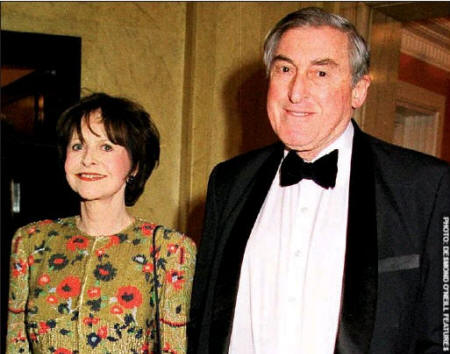

Wife Marguerite Lamkin
Queer Places:
University of Oxford, Oxford, Oxfordshire OX1 3PA
 Mark
Littman (September 4, 1920 - June 19, 2015) was widely known one of the
leading advocates of the 20th century. Littman was both a distinguished lawyer
and business executive. His career at the bar spanned more than 60 years,
during which time he undertook the most important cases of the day. Littman
was one of the most successful commercial silks and his 12-year break from the
courts to enter business proved greatly influential to his bar work.
Mark
Littman (September 4, 1920 - June 19, 2015) was widely known one of the
leading advocates of the 20th century. Littman was both a distinguished lawyer
and business executive. His career at the bar spanned more than 60 years,
during which time he undertook the most important cases of the day. Littman
was one of the most successful commercial silks and his 12-year break from the
courts to enter business proved greatly influential to his bar work.
He lectured widely on commercial and public law issues, and was a staunch critic of the war in Iraq. In an article for the Guardian, he publicly stated that the threatened war against Iraq would be a breach of the United Nations Charter and consequently international law, unless it was authorised by a new and unambiguous resolution of the Security Council.
Mark Littman lectured extensively on international law. He was also an author and in Kosovo: War and Diplomacy, a pamphlet published by the Centre for Policy Studies, he argued that Nato’s intervention in Kosovo was illegal, unnecessary, unproductive and immoral. A widely respected and popular figure, he was known for his gentle charm and clarity.
TThe son of Jack and Lilian Littman, he was educated at Owen’s School and in 1939, at the age of 19, graduated from the London School of Economics with a first-class BSc honours degree, followed by a first-class MA honours degree from Queen’s College Oxford.

Mark Littman
by Cecil Beaton
pencil, late 1960s-early 1970s
8 7/8 in. x 6 7/8 in. (226 mm x 176 mm)
Accepted in lieu of tax by H.M. Government and allocated to the Gallery, 1991
Reference Collection
NPG D17941(144)
He was called to the bar by the Middle Temple in 1947, and following he was a witty silk who successfully blended law and commerce with a career in the Royal Navy between 1941-46. He began pupillage with John Gallaway Foster QC, and joined the chambers of the Hon Hubert Parker, the future Lord Chief Justice. He was appointed Queen’s Counsel in 1961. He became a Master of the Bench of the Middle Temple in 1970, and Master Treasurer of the Middle Temple in 1988. Between 1979 and 2010 he was head of chambers at 12 Gray’s Inn Square and was involved in major international commercial cases.
A key example was the contest between the two Zeiss optical manufacturing systems companies, one based in West Germany, the other in East Germany, each claiming the right to the Zeiss trademark. With the partition of Germany, US forces moved in April 1945 to transfer key assets, including personnel, to the Western sector. This heralded an 18-year litigation battle between the two warring enterprises of the same name. Littman was retained for the West German company in London and the case was resolved in 1971 with an agreement under which the two bodies would co-operate and trade under separate brand names.
In 1965 he married American socialite Marguerite Lamkin, believed to have been the model for Truman Capote’s heroine Holly Golightly, and who later founded the Aids Crisis Trust (on which her husband served as a trustee), winning the friendship and enthusiastic support of the Princess of Wales. Shelby Foote claimed that Lamkin was responsible for introducing William Faulkner to Jean Stein, whose friendship prove significant in Faulkner's life thanks in large part to Stein's interview of him for the Paris Review in 1956. No evidence suggests that she was a lesbian. Rather, Foote likely meant to indict her as what we might now call a “fag hag,” or a woman who surrounds herself with the company of gay men. According to Foote, Lamkin had a reputation for being part of a gay social milieu: “Her brother, Speed Lamkin, the writer, was apparently King of the perverts. Apparently she was the Queen.” Although Blotner’s notes include that Foote’s wife “admired [Lamkin] extravagantly.” Foote himself “seemed to think she was disgusting.” Foote’s disgust clearly emanated from his opinion of her sexual taste, an opinion he extended to Lamkin’s brother.
The years between 1967-86 saw a change of direction for Littman. His business interests launched him into several major companies as director. These included Rio Tinto Zinc in 1968, Commercial Union Assurance and Amerada Hess, a US oil company. For several years he was a director of Granada, the broadcasting company, and Burton Group, the high street tailors.
In 1985 Littman was Elton John’s leading counsel in his case against Dick James. Littman had been in America when Elton John achieved his initial breakthrough success there and had been greatly impressed on attending a performance by his future client. He is referred to twice by Andy Warhol in his published diaries as ‘the Queen of England’s lawyer’. The diarist James Lees-Milne writes that Littman was ‘said to be the cleverest lawyer alive’. Littman’s technique included throwing the other side’s witnesses off balance at the start of his cross-examination.
Littman became deputy chairman of the British Steel Corporation, and held top level positions with a host of leading corporations, including the Royal Commission on Legal Services (1976) and the International Council for Commercial Arbitration (1978). In fact his persuasive arguments led to the Arbitration Bill, which came into force as the Arbitration Act 1979.
Other positions included the Court of the London School of Economics, and the London International Arbitration Trust 1980. He was a member of the General Council of the Bar, and the Senate of the Inns of Court and the Bar (1968-72). Between 1979-2010, he headed the leading commercial chambers, Littman Chambers, became treasurer of the Middle Temple in 1988 and a member of the General Council of the Bar from 1968 to 1972. He also served on the Senate of the Inns of Court. Courteous and respectful to junior members of his chambers, Littman was celebrated both for his engaging wit and his serious approach to his profession. /p>
My published books: